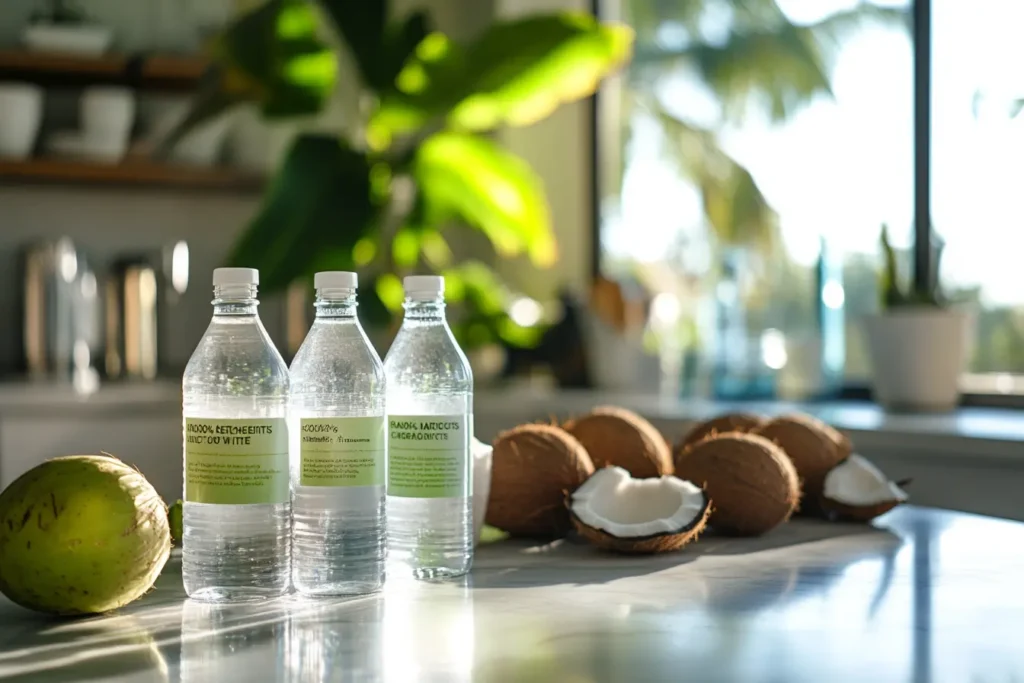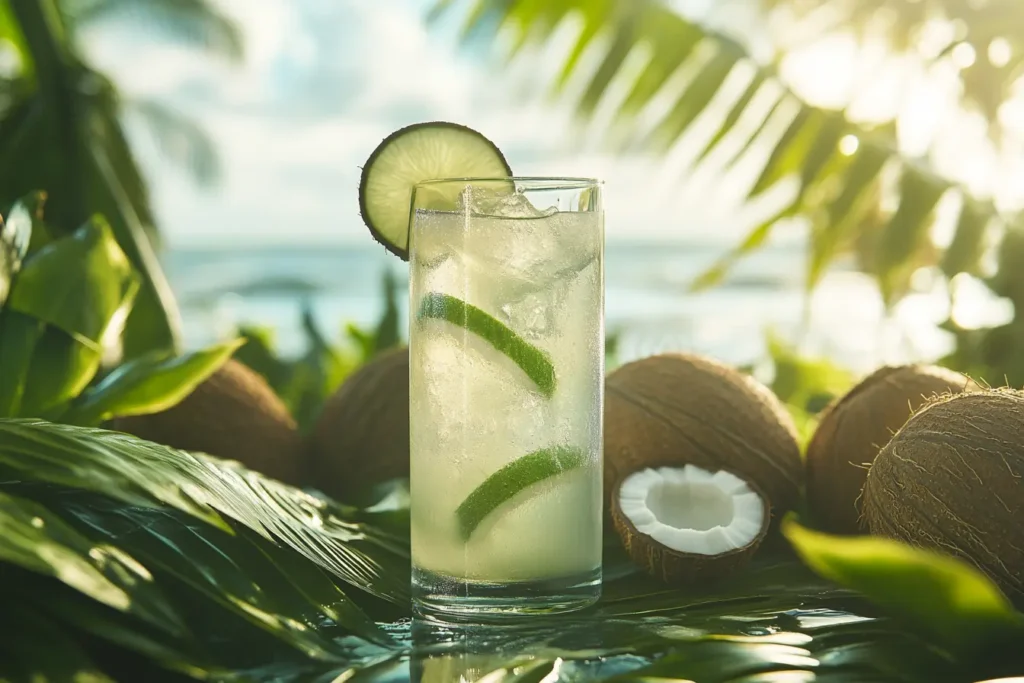Introduction
Coconut water has emerged as a beloved natural hydration option, offering a treasure trove of electrolytes, nutrients, and wellness benefits. Whether you’re an athlete seeking to replenish after a workout or simply trying to stay hydrated in the most wholesome way, this natural drink has got you covered. In this comprehensive exploration, we’ll dive into its fascinating properties, health advantages, and practical uses, all backed by science.
Understanding Coconut Water
Definition and Origin
Coconut water, often called the “liquid of life,” is the clear liquid found inside young, green coconuts. Unlike the rich and creamy coconut milk derived from mature coconut flesh, this water is naturally refreshing and mildly sweet. Originating in tropical regions, it has been cherished for centuries as a natural hydration source.
Nutritional Profile
What makes coconut water stand out? Its nutrient composition! Packed with essential electrolytes like potassium, magnesium, and a dash of sodium, it’s an optimal choice for staying energized. Additionally, coconut water is low in calories, virtually fat-free, and offers a hint of natural sugar, making it an excellent alternative to artificially sweetened drinks.
The Role of Electrolytes in Hydration
Importance of Electrolytes
Electrolytes are vital minerals that regulate fluid balance, nerve function, and muscle contractions. During activities like exercise or on sweltering days, the body loses these critical minerals through sweat. Without proper replenishment, dehydration, fatigue, and even cramps may strike.
Common Sources of Electrolytes
Traditional sources include sports drinks, bananas, and leafy greens. However, these often lack the convenience or natural allure of coconut water. Commercial beverages, while effective, may be laden with artificial flavors or added sugars, which coconut water thankfully avoids.
Coconut Water as a Natural Electrolyte Source
Electrolyte Composition of Coconut Water
The standout feature of coconut water is its balanced electrolyte profile. A single cup boasts about 600 mg of potassium—far more than a banana! It also contains magnesium, which supports muscle recovery, and trace amounts of calcium and phosphorus for bone health.
Comparison with Commercial Sports Drinks
Unlike store-bought sports beverages, coconut water offers a natural alternative free of synthetic dyes and high fructose corn syrup. It quenches thirst and replenishes electrolytes without weighing you down with extra additives. According to Healthline, its composition closely mimics the body’s natural plasma, enhancing its rehydration efficiency.
Health Benefits of Coconut Water
Coconut water isn’t just a hydration hero—it’s a powerhouse of health benefits that cater to a diverse range of needs. From improving cardiovascular health to providing antioxidant protection, this natural beverage is a true elixir for wellness.

Hydration and Electrolyte Balance
Rehydration After Exercise
Coconut water is a go-to drink for athletes and fitness enthusiasts. Its natural electrolyte composition helps replenish what the body loses during intense physical activities. Unlike plain water, it restores energy while preventing dehydration and muscle cramps. Its potassium content works like magic, aiding in quick recovery.
Prevention of Dehydration
Beyond workouts, coconut water is an effective remedy for dehydration caused by illness, heat, or even a long day outdoors. It’s an excellent option for restoring lost fluids without overwhelming the stomach, making it suitable for all age groups.
Cardiovascular Health
Blood Pressure Regulation
High in potassium and low in sodium, coconut water helps maintain blood pressure levels. The balance of electrolytes prevents strain on the heart, ensuring smooth circulation. Studies suggest that regular consumption can reduce hypertension over time.
Heart Disease Prevention
Coconut water’s magnesium and antioxidant properties work in tandem to protect against cardiovascular diseases. Its ability to improve cholesterol profiles further cements its role as a heart-friendly beverage.
Antioxidant Properties
Protection Against Free Radicals
Oxidative stress, caused by free radicals, contributes to aging and many diseases. Coconut water contains antioxidants that neutralize these harmful molecules, providing a natural defense mechanism for your body.
Reduction of Oxidative Stress
The rich levels of vitamins, minerals, and enzymes in coconut water help mitigate cellular damage. It’s not just a drink—it’s a way to rejuvenate your body from the inside out.
Kidney Health
Prevention of Kidney Stones
Coconut water is highly effective in reducing the risk of kidney stones. Its high potassium levels prevent crystal formation in the kidneys by diluting urine. A study from Medical News Today supports its efficacy as a natural preventative measure.
Support for Renal Function
Regular consumption promotes optimal kidney function by flushing out toxins and ensuring that the urinary system works smoothly.

Coconut Water Recipe: Hydrating Smoothie
Elevate your daily routine with a refreshing coconut water smoothie. It’s an easy-to-make drink packed with hydration, electrolytes, and flavor.
Ingredients
- 1 cup of fresh coconut water
- 1 ripe banana (for potassium)
- ½ cup frozen mango chunks (rich in antioxidants)
- 1 handful of spinach (for magnesium and iron)
- 1 tablespoon chia seeds (optional, for omega-3 fatty acids)
- 1 teaspoon honey (optional, for sweetness)
- Ice cubes (optional, for a chilled experience)
Step-by-Step Instructions
- Prepare Ingredients
Gather all your ingredients. Peel and slice the banana and wash the spinach thoroughly. - Combine Ingredients
In a blender, pour in the coconut water, followed by banana slices, frozen mango chunks, and spinach. - Add Optional Ingredients
For a thicker texture and nutritional boost, toss in chia seeds. Add honey if you prefer a sweeter taste. - Blend Smoothly
Blend the mixture on high speed for about 1–2 minutes until you achieve a smooth and creamy consistency. - Adjust Consistency
If it feels too thick, add more coconut water. For a cooler drink, blend with a few ice cubes. - Serve and Enjoy
Pour the smoothie into a tall glass and enjoy your healthy, hydrating beverage immediately.
Nutritional Content
Below is the nutritional breakdown of this recipe (per 100g):
| Nutrient | Amount | % Daily Value |
|---|---|---|
| Calories | 50 kcal | 2.5% |
| Potassium | 220 mg | 6% |
| Magnesium | 15 mg | 4% |
| Vitamin C | 7 mg | 8% |
| Fiber | 1.2 g | 5% |
In the following segment, we’ll explore how coconut water fits into various lifestyles, including its use in sports nutrition and daily diets.
Practical Uses of Coconut Water
Coconut water isn’t just a health drink; it’s a versatile ingredient that seamlessly fits into everyday life, whether you’re whipping up recipes, enhancing your diet, or focusing on post-workout recovery.
Coconut Water in Sports Nutrition
Pre-Workout Hydration
Preparing your body before exercise is essential, and coconut water makes an excellent pre-workout drink. Thanks to its rich potassium content, it helps maintain electrolyte levels, ensuring your muscles are ready for action. Its natural sugars provide a quick energy boost without causing spikes in blood sugar.
Post-Workout Recovery
After an intense workout, rehydration is critical. Coconut water replenishes lost electrolytes, aiding in quicker muscle recovery. Its magnesium content helps reduce muscle cramps and soreness, making it a perfect post-exercise drink for athletes and fitness enthusiasts.
Coconut Water in Daily Diet
As a Beverage
Coconut water is a refreshing drink that can be consumed on its own, providing a natural alternative to sugary sodas and juices. It’s hydrating, delicious, and gentle on the stomach, making it a great option for all ages.
In Smoothies and Recipes
Adding coconut water to smoothies boosts their nutritional value while enhancing their taste. It works wonderfully in tropical-inspired drinks, soups, and even salad dressings, offering a unique flavor that’s both subtle and delightful.
Considerations for Specific Populations
During Pregnancy
Pregnant individuals often deal with dehydration or electrolyte imbalances due to hormonal changes. Coconut water provides a safe, natural way to stay hydrated and maintain necessary nutrients like potassium and magnesium.
For Individuals with Health Conditions
Coconut water is especially beneficial for those managing blood pressure or prone to dehydration due to certain conditions. However, moderation is key, as excessive consumption may disrupt electrolyte balance for some.
Potential Risks and Considerations
While coconut water offers a bounty of health benefits, it’s important to approach it with a balanced perspective. Like any health product, it comes with certain caveats that should be considered to ensure safe and effective consumption.
Possible Side Effects
Gastrointestinal Issues
In some cases, consuming coconut water may lead to bloating or an upset stomach, especially if consumed in large quantities. This can be due to its natural sugar content or the body’s sensitivity to tropical foods.
Electrolyte Imbalance
Though coconut water is rich in potassium, excessive consumption could lead to hyperkalemia—a condition characterized by too much potassium in the blood. Symptoms may include irregular heartbeat or muscle weakness.
Interactions with Medications
Blood Pressure Medications
Coconut water’s ability to lower blood pressure is generally a benefit. However, when combined with prescribed medications for hypertension, it could cause a further drop, potentially leading to dizziness or fainting.
Diuretics
Since it naturally acts as a mild diuretic, coconut water can amplify the effects of diuretic medications, which might lead to excessive fluid loss. Monitoring intake in these scenarios is recommended.
Quality and Safety of Commercial Coconut Water
Additives and Preservatives
Not all coconut water products deliver the same health benefits, and some fall short of expectations. For instance, many commercially available options include added sugars, artificial flavors, and preservatives, which significantly reduce their natural value. Therefore, to enjoy the full benefits of coconut water, you should always select 100% pure options. Furthermore, reading the labels carefully ensures you avoid unnecessary additives. As a result, choosing unprocessed coconut water guarantees a healthier and more authentic hydration experience.
Pasteurization and Raw Products
While pasteurization ensures safety, it may slightly reduce the nutrient content of coconut water. On the other hand, raw coconut water offers the purest form but requires proper storage to prevent spoilage.
Frequently Asked Questions
Coconut water fascinates many, so questions often arise about its uses, benefits, and safety. To provide better clarity and deeper insights, we’ll address some of the most commonly asked questions. Moreover, this discussion ensures you fully understand how coconut water fits into a healthy lifestyle. Additionally, by exploring these answers, you’ll uncover why coconut water continues to gain popularity among health-conscious individuals. Furthermore, this information will help you make informed choices about incorporating it into your routine. Thus, let’s dive into these common inquiries and reveal the essential details about this incredible natural beverage.
Is coconut water effective for rehydration after exercise?
Absolutely! Coconut water is rich in essential electrolytes like potassium and magnesium, which replenish what’s lost through sweat. Its natural sugars also help restore energy levels. Many athletes prefer it over commercial sports drinks because it’s free of artificial additives and sweeteners.
Can coconut water help with weight loss?
Yes, coconut water can be a supportive addition to a weight-loss plan. It’s low in calories and contains natural electrolytes that keep you hydrated and energized during workouts. Its mild sweetness can also curb sugar cravings, making it a healthier alternative to sugary beverages.
Is it safe to drink coconut water every day?
For most people, yes! Daily consumption of coconut water can boost hydration, provide essential nutrients, and support overall health. However, moderation is key, particularly for individuals with kidney conditions or those monitoring their potassium intake.
How does coconut water compare to traditional sports drinks?
Coconut water stands out as a natural electrolyte drink, whereas sports drinks often contain artificial colors, preservatives, and high levels of sugar. While both are effective for hydration, coconut water is a cleaner, healthier option with fewer calories and no synthetic additives.
Can coconut water prevent kidney stones?
Yes, coconut water has been shown to reduce the risk of kidney stones. It helps by diluting urine and reducing crystal formation, thanks to its high potassium content. Regular consumption can also support kidney health by flushing out toxins.
Is coconut water suitable for people with diabetes?
Coconut water can be safe for individuals with diabetes, as it has a low glycemic index and contains natural sugars. However, it’s important to consume it in moderation and choose unsweetened varieties to avoid unnecessary spikes in blood sugar levels.

